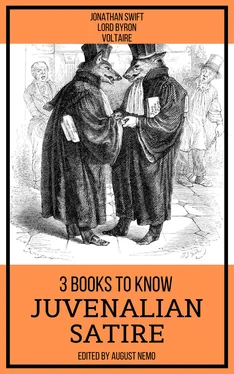But then, no doubt, it equally as true is,
A good deal may be bought for fifty Louis.
Julia had honour, virtue, truth, and love,
For Don Alfonso; and she inly swore,
By all the vows below to powers above,
She never would disgrace the ring she wore,
Nor leave a wish which wisdom might reprove;
And while she ponder'd this, besides much more,
One hand on Juan's carelessly was thrown,
Quite by mistake—she thought it was her own;
Unconsciously she lean'd upon the other,
Which play'd within the tangles of her hair:
And to contend with thoughts she could not smother
She seem'd by the distraction of her air.
'T was surely very wrong in Juan's mother
To leave together this imprudent pair,
She who for many years had watch'd her son so—
I 'm very certain mine would not have done so.
The hand which still held Juan's, by degrees
Gently, but palpably confirm'd its grasp,
As if it said, 'Detain me, if you please;'
Yet there 's no doubt she only meant to clasp
His fingers with a pure Platonic squeeze:
She would have shrunk as from a toad, or asp,
Had she imagined such a thing could rouse
A feeling dangerous to a prudent spouse.
I cannot know what Juan thought of this,
But what he did, is much what you would do;
His young lip thank'd it with a grateful kiss,
And then, abash'd at its own joy, withdrew
In deep despair, lest he had done amiss,—
Love is so very timid when 't is new:
She blush'd, and frown'd not, but she strove to speak,
And held her tongue, her voice was grown so weak.
The sun set, and up rose the yellow moon:
The devil 's in the moon for mischief; they
Who call'd her CHASTE, methinks, began too soon
Their nomenclature; there is not a day,
The longest, not the twenty-first of June,
Sees half the business in a wicked way
On which three single hours of moonshine smile—
And then she looks so modest all the while.
There is a dangerous silence in that hour,
A stillness, which leaves room for the full soul
To open all itself, without the power
Of calling wholly back its self-control;
The silver light which, hallowing tree and tower,
Sheds beauty and deep softness o'er the whole,
Breathes also to the heart, and o'er it throws
A loving languor, which is not repose.
And Julia sate with Juan, half embraced
And half retiring from the glowing arm,
Which trembled like the bosom where 't was placed;
Yet still she must have thought there was no harm,
Or else 't were easy to withdraw her waist;
But then the situation had its charm,
And then—God knows what next—I can't go on;
I 'm almost sorry that I e'er begun.
O Plato! Plato! you have paved the way,
With your confounded fantasies, to more
Immoral conduct by the fancied sway
Your system feigns o'er the controulless core
Of human hearts, than all the long array
Of poets and romancers:—You 're a bore,
A charlatan, a coxcomb—and have been,
At best, no better than a go-between.
And Julia's voice was lost, except in sighs,
Until too late for useful conversation;
The tears were gushing from her gentle eyes,
I wish indeed they had not had occasion,
But who, alas! can love, and then be wise?
Not that remorse did not oppose temptation;
A little still she strove, and much repented
And whispering 'I will ne'er consent'—consented.
'T is said that Xerxes offer'd a reward
To those who could invent him a new pleasure:
Methinks the requisition 's rather hard,
And must have cost his majesty a treasure:
For my part, I 'm a moderate-minded bard,
Fond of a little love (which I call leisure);
I care not for new pleasures, as the old
Are quite enough for me, so they but hold.
O Pleasure! you are indeed a pleasant thing,
Although one must be damn'd for you, no doubt:
I make a resolution every spring
Of reformation, ere the year run out,
But somehow, this my vestal vow takes wing,
Yet still, I trust it may be kept throughout:
I 'm very sorry, very much ashamed,
And mean, next winter, to be quite reclaim'd.
Here my chaste Muse a liberty must take—
Start not! still chaster reader—she 'll be nice hence—
Forward, and there is no great cause to quake;
This liberty is a poetic licence,
Which some irregularity may make
In the design, and as I have a high sense
Of Aristotle and the Rules, 't is fit
To beg his pardon when I err a bit.
This licence is to hope the reader will
Suppose from June the sixth (the fatal day,
Without whose epoch my poetic skill
For want of facts would all be thrown away),
But keeping Julia and Don Juan still
In sight, that several months have pass'd; we 'll say
'T was in November, but I 'm not so sure
About the day—the era 's more obscure.
We 'll talk of that anon.—'T is sweet to hear
At midnight on the blue and moonlit deep
The song and oar of Adria's gondolier,
By distance mellow'd, o'er the waters sweep;
'T is sweet to see the evening star appear;
'T is sweet to listen as the night-winds creep
From leaf to leaf; 't is sweet to view on high
The rainbow, based on ocean, span the sky.
'T is sweet to hear the watch-dog's honest bark
Bay deep-mouth'd welcome as we draw near home;
'T is sweet to know there is an eye will mark
Our coming, and look brighter when we come;
'T is sweet to be awaken'd by the lark,
Or lull'd by falling waters; sweet the hum
Of bees, the voice of girls, the song of birds,
The lisp of children, and their earliest words.
Sweet is the vintage, when the showering grapes
In Bacchanal profusion reel to earth,
Purple and gushing: sweet are our escapes
From civic revelry to rural mirth;
Sweet to the miser are his glittering heaps,
Sweet to the father is his first-born's birth,
Sweet is revenge—especially to women,
Pillage to soldiers, prize-money to seamen.
Sweet is a legacy, and passing sweet
The unexpected death of some old lady
Or gentleman of seventy years complete,
Who 've made 'us youth' wait too—too long already
For an estate, or cash, or country seat,
Still breaking, but with stamina so steady
That all the Israelites are fit to mob its
Next owner for their double-damn'd post-obits.
'T is sweet to win, no matter how, one's laurels,
By blood or ink; 't is sweet to put an end
To strife; 't is sometimes sweet to have our quarrels,
Particularly with a tiresome friend:
Sweet is old wine in bottles, ale in barrels;
Dear is the helpless creature we defend
Against the world; and dear the schoolboy spot
We ne'er forget, though there we are forgot.
But sweeter still than this, than these, than all,
Is first and passionate love—it stands alone,
Like Adam's recollection of his fall;
The tree of knowledge has been pluck'd—all 's known—
And life yields nothing further to recall
Worthy of this ambrosial sin, so shown,
No doubt in fable, as the unforgiven
Fire which Prometheus filch'd for us from heaven.
Man 's a strange animal, and makes strange use
Of his own nature, and the various arts,
And likes particularly to produce
Some new experiment to show his parts;
This is the age of oddities let loose,
Where different talents find their different marts;
You 'd best begin with truth, and when you 've lost your
Labour, there 's a sure market for imposture.
Читать дальше












